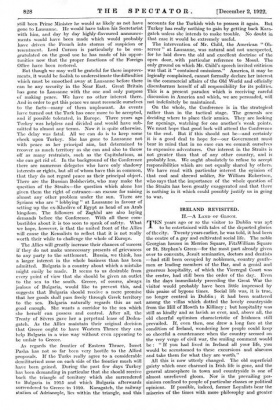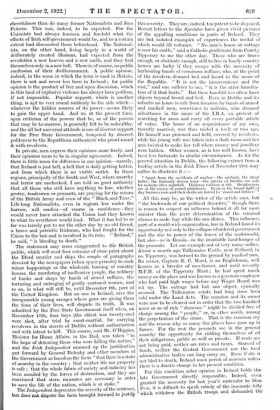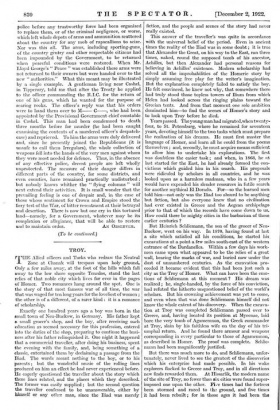T EN years ago or so the visitor to Dublin was
apt to be entertained with tales of the departed glories of the city. Twenty years earlier, he was told, it had been the centre of a gay and cultivated social life. The noble Georgian houses in Merrion Square, FitzWilliam Square or St. Stephen's Green—for the most part already given over to convents, Jesuit seminaries, doctors and dentists —had still been occupied by noblemen, country gentle- men or leading members of the Bar, and a genial and generous hospitality, of which the Viceregal Court was the centre, had still been the order of the day. Even in the days immediately preceding the Great War the visitor would probably have been little impressed by this praise of bygone times. Social life was, it is true, no longer centred in Dublin ; it had been scattered among the villas which dotted the lovely countryside from the Hill of Howth to Killiney ; but hospitality was still as kindly and as lavish as ever, and, above all, the old cheerful optimism characteristic of Irishmen still prevailed. If, even then, one drew a long face at the condition of Ireland, wondering how people could keep so cheerful a countenance when the country seemed on the very verge of civil war, the smiling comment would be : "If you had lived in Ireland all your life, you would be accustomed to these excursions and alarums and take them for what they are worth."
All this is now utterly changed. The old superficial- gaiety which once charmed in Irish life is gone, and the general atmosphere in town and countryside is one of almost unrelieved gloom. Nor is the prevailing pes- simism confined to people of particular classes or political opinions. If possible, indeed, former Loyalists bear the miseries of the times with more philosophy and greater cheerfulness than do many former Nationalists and Shin Feiners. This was, indeed, to be expected. For the -Unionists had always foreseen and foretold what the effects of Irish self-government would be, and to a certain extent had discounted them beforehand. The National- ists, on the other hand, living largely in a world of deliberately created illusions, had expected from the revolution a new heaven and a new earth, and they find themselves only in a new hell. There is, of course, no public confession of their disillusionment. A 'public opinion, indeed, in the sense in which the term is used in Britain, there is not and never has been in Ireland ; for public opinion is the product of free and open discussion, which in this land of explosive violence has always been perilous, if not impossible. Popular support, which is another thing, is apt to veer round suddenly to the side which— whatever the hidden sources of its power—seems likely to gain the upper hand. And so, at the present time, open criticism of the 'powers that be, or of the powers that may be to-morrow, is generally felt to be unhealthy, and the all but universal attitude is one of discreet support for the Free State Government, tempered by discreet politeness to the Republican enthusiasts who prowl round it with revolvers.
In .private, men express their opinions more freely, and their opinions seem to be in singular agreement. Indeed, there is little room for difference in one opinion—namely, that Ireland is just hell, a hell that is daily getting hotter, and from which there is no visible outlet. In those regions, principally of the South and West, where anarchy and terror are unchecked, I am told on good authority that all those who still have anything to lose, whether gentry, tradesmen or peasants, are praying for the return of the British Army and even of the "Black-and-Tans." Life-long Nationalists, even in regions less under the harrow, will confess—of course in confidence—they would never have attacked the Union had they known to what its overthrow would lead. What it has led to so far was tersely put to me the other day by an Old friend, a brave and patriotic Irishman, who had fought for the Union to the last and is involved in its ruin. "Ireland," he said, "is bleeding to death."
The statement may seem exaggerated to tlie British public, which will read four columns of close print about the Ilford murder and skips the couple of paragraphs devoted by the newspapers (when space permits) to such minor happenings as the wholesale burning of country houses, the murdering of inoffensive people, the robbery of banks and shops by bands of armed ruffians, the torturing and outraging of gently nurtured women, and so on, in what will still be, until December 6th, part of the United Kingdom. But no one in Ireland, save the irresponsible young savages whose guns are giving them the time of their lives, will dispute its truth. It was admitted by the Free State Government itself when, on November 17th, four boys (the eldest was twenty-one) were shot, after trial by court-martial, for carrying revolvers in the streets of Dublin without authorization and with intent to kill. This course, said Mr. O'Higgins, Minister for Home Affairs, in the Dail, was taken "in the hope of deterring those who were killing the nation," and the Irish Independent summed up the justification put forward by General Mulcahy and other members of the Government as based on the facts "that there is a state of anarchy in the country ; that neither life nor property is safe ; that the whole fabric of society and industry has been assailed by the forces of destruction, and they are convinced that stern measures arc necessary in order to save the. life of the nation, which is at stake."
The Independent deprecates the severity of the sentence, but does not diSpute the facts brought forward to justify this severity. They are, indeed, too patent to be disputed. Recent letters to the Spectator have given vivid pictures of the appalling conditions in parts of Ireland. They are but isolated examples of experiences the recital of which would fill volumes. "No man's house or cottage is now his castle," said a Catholic gentleMan from County Tipperary to me the other day. Those who are brave enough, or obstinate enough, still to live in lonely country houses are lucky if they escape with the necessity of harbouring bands of verminous ruffians, who, at the point of the revolver, demand bed and board in the name of the Republic. " It is not the inconvenience and the cost," said one sufferer to me, " it is the utter humilia- tion of it that hurts." But these banditti too often have objects beyond board and bed. Even in Dublin and its suburbs no house is safe from invasion by bands of armed and masked men, sometimes in uniform, who demand admittance in the name of the I.R.A. on pretext of searching for arms and carry off every portable article of value. The home of an acquaintance of my own, recently married, was thus raided a week or two ago. He himself was pinioned and held, covered by revolvers, while his young wife was taken into a dark room and her arm twisted to make her tell where money and jewellery were hidden. Other women, as is too well known, have been less fortunate in similar circumstances. As for the general situation in Dublin, the following extract from a leading article in the Irish Times of November 21st may suffice to illustrate it :— " Apart from the accidents of warfare—the ambush, the stray bullet, the furiously driven lorry—the streets of Dublin are safe for nobody after nightfall. Highway robbery is rife. Shopkeepers are at the mercy of armed plunderers. Even in the broad light of day business men and their clerks are forced to 'stand and deliver."!
All this may be, as the writer of the article says, but "the backwash of our political disorders," though there is reason to suspect an influence behind it all far more sinister than the mere determination of the criminal classes to make hay while the sun shines. This influence, part of a world-wide organization, has in Ireland found its opportunity not only in the collapse of ordered government and the rise to power of the forces of the underworld, but also—as in Russia—in the insatiable land-hunger of the peasants. Let one example out of very many suffice.
About a month ago Tullamaine Castle, near Fethard, in co. Tipperary, was burned to the ground by masked men.
Its owner, Captain E. C. Morel, is an Englishman, well known as a breeder of race-horses, and until recently M.F.H. of the Tipperary Hunt ; he had spent much money on the place and was known as a generous employer who had paid high wages before any Wages Board was set up. The outrage had but one object, cynically avowed. The Tullamaine estate had long since been sold under the Land Acts. The mansion and its owner were now to be cleared out in order that the two hundred acres or so of rich " demesne " might be divided free of charge among the "people," or, in other words, among the perpetrators of the crime. That is the common cry and the reason why so many fine places have gone up in flames. For the rest the peasants see in the general anarchy the opportunity for ridding themselves of all their obligations, public as well as private. If rents are not being paid, neither are rates and taxes. Starved of funds, neither the Central Government nor the local administrative bodies can long carry on. Even if she is not bled to death, Ireland must perish of anaemia unless there is a drastic change in her present condition.
For this condition sober opinion in Ireland holds the late Government directly responsible. Indeed, even granted the necessity for last year's surrender to Sinn Fein, it is difficult to speak calmly of the insensate folly which withdrew the British troops and 'disbanded the police before any trustworthy force had been organized to replace them, or of the criminal negligence, or worse, which left whole depots of arms and ammunition scattered about the country for any mob of rapscallions to seize. Nor was this all. The arms, including sporting-guns, of the country gentry and other respectable citizens had been impounded by the Government, to be returned when peaceful conditions were restored. When Mr. Lloyd George's "Peace "was established these arms were not returned to their owners but were handed over to the new "authorities." What this meant may be illustrated by a single example. A gentleman living near Cashel, in Tipperary, told me that after the Treaty he applied to the officer commanding the R.I.C. for the return of one of his guns, which he wanted for the purpose of scaring rooks. The officer's reply was that his orders were to hand them over to M— C—, who had been appointed by the Provisional Government chief constable in Cashel. This man had been condemned to death three months before for murder (he had been caught examining the contents of a murdered officer's despatch- case) and reprieved. To him the arms were duly delivered and, since he presently joined the Republicans (it is unsafe to call them Irregulars), the whole collection of weapons fell into the hands of the very men against whom they were most needed for defence. Thus, in the absence of any effective police, decent people are left wholly unprotected. The measure of their danger differs in different parts of the country, for some districts, and even counties, have remained practically undisturbed ; but nobody knows whither the "flying columns" will next extend their activities. It is small wonder that the prevailing feeling is one of despair and, in the case of those whose sentiment for Crown and Empire stood the fiery test of the War, of bitter resentment at their betrayal and desertion. There is now but one cry in this tortured land—namely, for a Government, whatever may be its complexion or allegiance, that will be able to restore (To be continued.)








































































 Previous page
Previous page